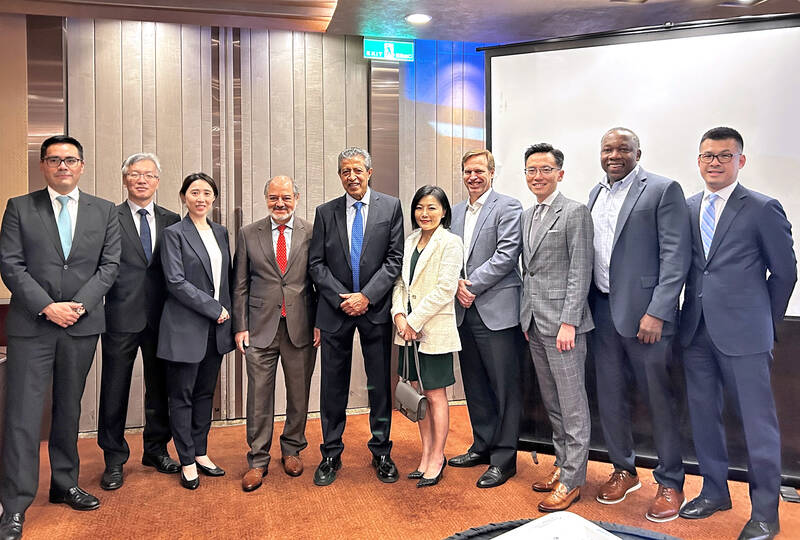Citi Taiwan and Citibanamex, jointly organized a “Mexico Day”client forum in Taipei to demonstrate Citi’s strong support for clients existing and potential investments in Mexico and foster the further development of the Taiwan-Mexico trade corridor.
“Mexico is now the largest trading partner for the U.S. and it offers tremendous nearshoring benefits such as faster delivery to buyers, lower transportation costs and helping buyers achieve their just-in-time inventory management objectives. Citi has an exceptionally large presence in Mexico and is well-positioned to help our clients with their banking needs,” remarked Aftab Ahmed, Chairman of Citibank Taiwan.

Mexico has emerged as a preferred destination for Taiwanese businesses seeking to establish nearshoring supply chains for expanding into the U.S. market. Over 300 Taiwanese enterprises have ventured into the Mexican market across various sectors including cloud computing, industrial servers, computers, LED TV assembly, and automotive components. The bilateral trade value between Taiwan and Mexico surged from $5.386 billion in 2021 to $6.368 billion in 2023, marking an impressive 18% increase.
Susan Wang, Citi Taiwan Head of Corporate Banking, pointed out the rising trend of “Close to Home” seen across notable global multinational corporations. Mexico is a prime destination for global leading manufacturers due to its proximity to the U.S. market, potentially mitigating risks and costs associated with manufacturing. To support Taiwanese companies’ expansion plan in Mexico, Citi’s global teams are dedicated to deliver prompt service to clients round-the-clock.
Martin Torres, Head of the Office of Mexico in Taiwan, highlighted Mexico’s strategic significance as a gateway to North America, Latin America, and the global market. With clusters such as the automobile and manufacturing industries, coupled with a skilled and cost-effective workforce, Mexico is attracting more foreign investment. Torres urged Taiwanese companies to capitalize on Mexico’s potential and regard it as a frontier to penetrate the U.S. market.
As a leading international bank with a physical presence in 95 markets, Citi is well positioned to leverage the strength of its global network and provide comprehensive financial services and solutions to support clients in business growth. In terms of optimizing working capital and cross-border cash flow, Citi provides corporate clients with international remittance services in 140 different currencies. Moreover, Citi has launched mobile banking for enterprises, remittance intelligent detection services, liquidity management and automated reconciliation services to help clients flexibly handle various operational and funding needs.

Intel Corp chief executive officer Lip-Bu Tan (陳立武) is expected to meet with Taiwanese suppliers next month in conjunction with the opening of the Computex Taipei trade show, supply chain sources said on Monday. The visit, the first for Tan to Taiwan since assuming his new post last month, would be aimed at enhancing Intel’s ties with suppliers in Taiwan as he attempts to help turn around the struggling US chipmaker, the sources said. Tan is to hold a banquet to celebrate Intel’s 40-year presence in Taiwan before Computex opens on May 20 and invite dozens of Taiwanese suppliers to exchange views

Application-specific integrated circuit designer Faraday Technology Corp (智原) yesterday said that although revenue this quarter would decline 30 percent from last quarter, it retained its full-year forecast of revenue growth of 100 percent. The company attributed the quarterly drop to a slowdown in customers’ production of chips using Faraday’s advanced packaging technology. The company is still confident about its revenue growth this year, given its strong “design-win” — or the projects it won to help customers design their chips, Faraday president Steve Wang (王國雍) told an online earnings conference. “The design-win this year is better than we expected. We believe we will win

Chizuko Kimura has become the first female sushi chef in the world to win a Michelin star, fulfilling a promise she made to her dying husband to continue his legacy. The 54-year-old Japanese chef regained the Michelin star her late husband, Shunei Kimura, won three years ago for their Sushi Shunei restaurant in Paris. For Shunei Kimura, the star was a dream come true. However, the joy was short-lived. He died from cancer just three months later in June 2022. He was 65. The following year, the restaurant in the heart of Montmartre lost its star rating. Chizuko Kimura insisted that the new star is still down

While China’s leaders use their economic and political might to fight US President Donald Trump’s trade war “to the end,” its army of social media soldiers are embarking on a more humorous campaign online. Trump’s tariff blitz has seen Washington and Beijing impose eye-watering duties on imports from the other, fanning a standoff between the economic superpowers that has sparked global recession fears and sent markets into a tailspin. Trump says his policy is a response to years of being “ripped off” by other countries and aims to bring manufacturing to the US, forcing companies to employ US workers. However, China’s online warriors